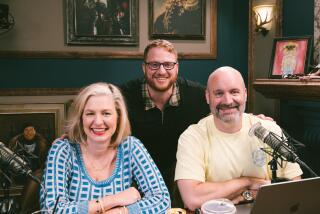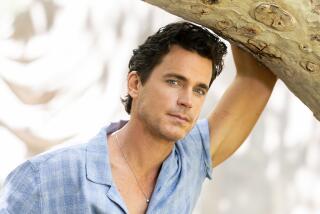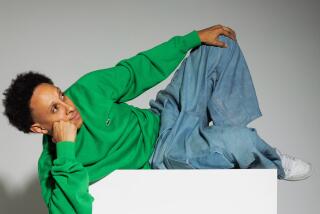Chris Kelly and Sarah Schneider admit to kind of being the real ones of ‘The Other Two’

Show creators and executive producers Sarah Schneider and Chris Kelly share the origins of the show and the influence from their “SNL” days.
Comedy Central’s “The Other Two” can be a festival of indignities large and small for its titular, 20-something siblings. The show’s creators, former “Saturday Night Live” head writers Chris Kelly and Sarah Schneider, said at an Envelope Live screening and Q&A at the Montalbán in Hollywood that they’re just writing what they know.
In the series, Cary (Drew Tarver) is struggling to make it as an actor in New York and sister Brooke (Heléne Yorke) is just generally struggling there. Meanwhile, their 13-year-old brother, the improbably named Chase Dreams (Case Walker), casually becomes an overnight superstar with one viral song, “Marry U at Recess.”
Schneider said, “We knew we wanted to write characters living in New York, trying to figure stuff out still, not sure what their path is, not sure in their sexuality, we wanted to tell small stories with that. But then we loved writing those music videos at ‘SNL,’ so we were like, ‘How do we hook those two ideas together?’ ”
“We wanted this dumb ‘Chase Dreams’ fame to make people deal with the real things,” said Kelly. “So we always talked about, ‘If Chase Dreams didn’t exist, Cary would still be having to deal with his sexuality [the character has not been out as gay for long]. Brooke would still have to be thinking, “What next? I don’t know what my next chapter is in my life.” ’ So how does Chase make things worse for them, make things better for them? … So yeah, we like that it helps and hurts and makes them figure things out maybe faster than they normally would have.”

Show creators and executive producers Sarah Schneider and Chris Kelly reveal how much of their life influenced the lead characters.
Are the protagonists doppelgangers for the creators?
“Yeah … I mean, yes and no,” said Kelly. “Cary is definitely a version of us when we were in our 20s.”
He paused, considering the sitcom’s episode the audience had just seen, in which Cary bumbles through receiving a measure of fame after Chase releases a song praising him specifically for being gay.
“Or … this episode is, verbatim, things I’ve been through,” he said, and both laughed.
“But yeah, when we wrote the pilot in the writers’ room, we just brainstormed real things we’d been through, like, as people, as people trying to be in the comedy world. So even that idea of someone being like, ‘I didn’t know you were gay,’ and [Cary] being like, ‘Thank you’; that is such a thing that I’ve felt … it just felt like such a relatable thing that we’d all been like,” he said, putting on a genial tone that quickly soured, “ ‘Oh yeah … ugh.’ We’ve all kind of seen people do that or felt it ourselves when we first were out.
“So we tried to come up with just the absolute worst possible things that we’ve gone through and then been like, ‘How can that be exacerbated via Chase Dreams?’ ”

Show creators and executive producers Sarah Schneider and Chris Kelly talk about how their working relationship began at “Saturday Night Live.”
Kelly and Schneider joined the writing staff of ‘SNL’ at the same time and forged a bond making music videos there, mostly with female cast members such as Aidy Bryant and Kate McKinnon.
“ ‘(Do It on My) Twin Bed’ was like the first video we wrote together that really felt like ‘a hit’ or something, whatever that means,” said Schneider of the “sexy” peek at a visit home that exemplifies the hometown awkwardness that infuses much of the duo’s work together.

Kelly said, “ ‘SNL’ is such a mad dash every week, so when something works, you just follow that, you follow the fun, you follow the same people. You only have one night to write everything, so I think when that worked, we were like, ‘Let’s keep doing this until it stops working!’ ”
That all-life-clumsiness is a big part of “The Other Two,” as when Chase — not a diva, but a happy kid sort of floating through it all — makes that popular song, “My Brother’s Gay and That’s OK!”
Kelly said, “It’s funny to us that it was well-meaning. He was like, ‘This is cool; I can’t wait for my brother to see this!’ He hadn’t anticipated all the ping-ponging it made his brother do all day.”
Schneider added, “That was always the most interesting part about the industry and these kind of like, teen stars to us, was seeing the machine behind them, that was like, Wanda Sykes — who’s amazing — and her whole team of 20-plus people sitting around and being like, ‘What would be the right move for this kid to do next? So it’s kind of this curated authenticity, where he is just along for the ride. He loves his brother.”
Kelly said, “We imagined that they were like, ‘What about singing a song about how your brother is gay and that’s OK?’ And he was probably like, ‘Oh, that’s cool! My brother is gay, and it is OK!’
“But he didn’t realize they were doing it because they were like, ‘OK, now we’ll get the gays. And after you get the gays, we’re going to move on to, like, sex, and we’ll get the girls.’ ”

When an audience member asked about whether they ever catch flak for broaching hot-button subjects, Kelly acknowledged the danger of rushing in where the sensitive fear to tread.
“To us, at least, it’s on the right side of the joke. We’re parodying and satirizing the way sometimes people talk to gay people … we’re not throwing the f-word out there willy-nilly just to be provocative, for example,” he said of the show’s use of a certain homophobic slur.
“We talk so much about this stuff in the room,” said Schneider. “If we even go near this, it would never be ‘Let’s join the conversation and have a blast!’ It would always be ‘Are we servicing our characters, are we servicing a larger idea ... are we advancing the story?’ It’s not just for fun.”

Show creators and executive producers Sarah Schneider and Chris Kelly talk about the use of offensive language within the show, specifically toward their gay character.
More to Read
From the Oscars to the Emmys.
Get the Envelope newsletter for exclusive awards season coverage, behind-the-scenes stories from the Envelope podcast and columnist Glenn Whipp’s must-read analysis.
You may occasionally receive promotional content from the Los Angeles Times.








